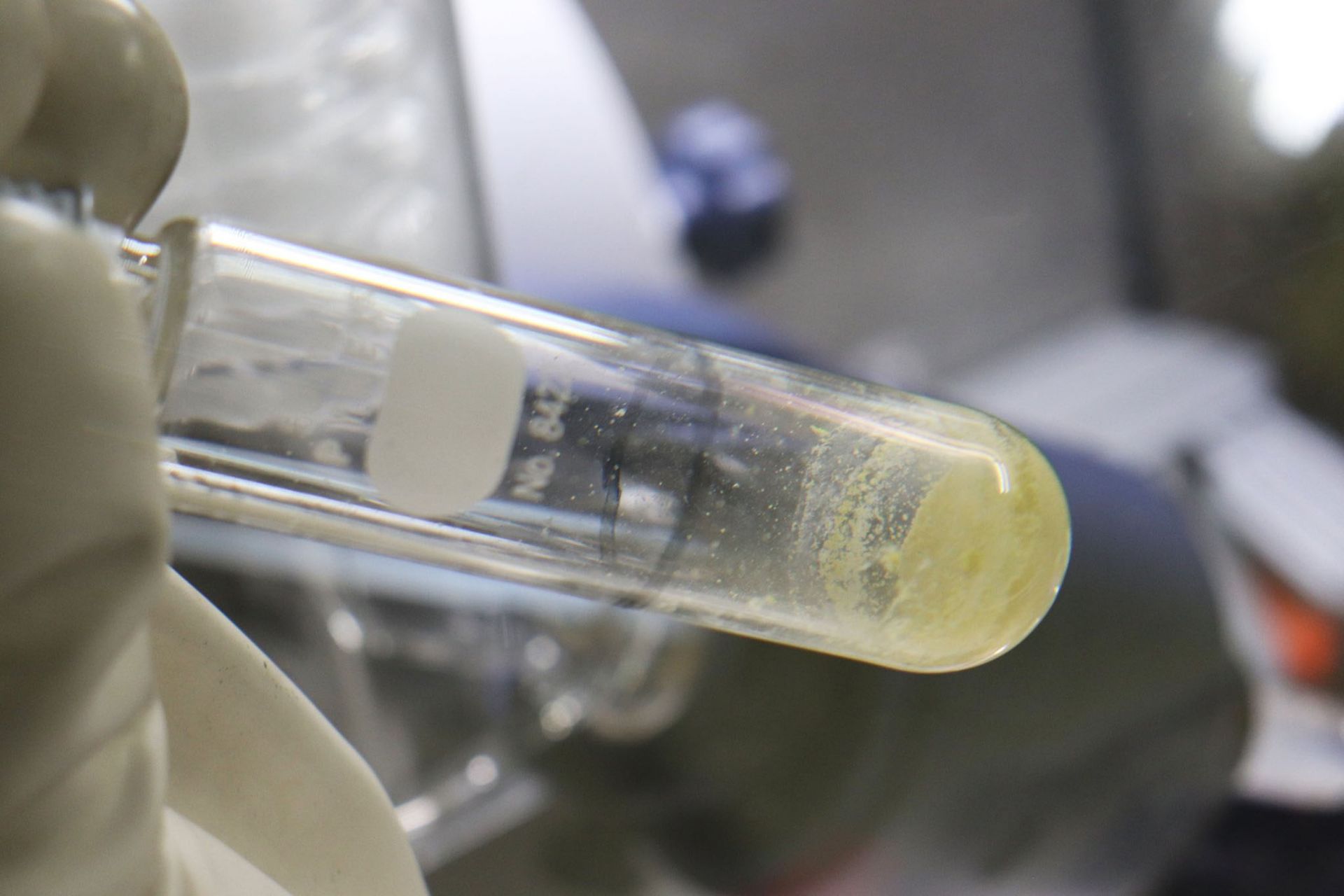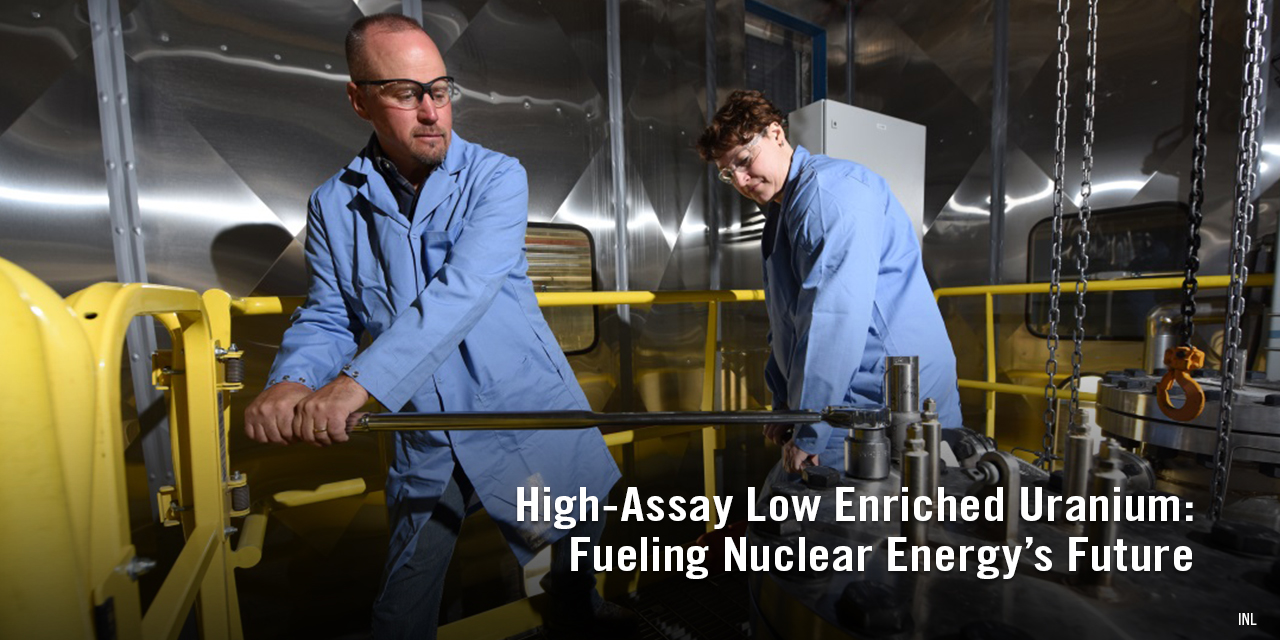The DOE and a contractor recently succeeded in disposing of Oak Ridge’s low-activity U-233, but not before recovering Th-229 from the material.
A vial containing Th-299 extracted from uranyl nitrate.
This past October, the Department of Energy’s Oak Ridge Office of Environmental Management (OREM) and its contractor Isotek successfully completed processing and disposing the low-dose inventory of uranium-233 stored at Oak Ridge National Laboratory (ORNL), ending a two-year effort that has eliminated a portion of the site’s legacy nuclear material and provided rare nuclear isotopes for next-generation cancer treatment research.
Workers construct a new ventilation system's filter building last year at WIPP. (Photo: DOE)
Without a plan for addressing issues in completing construction projects at the Waste Isolation Pilot Plant in New Mexico, the Department of Energy cannot ensure that further cost increases and schedule delays will not continue, according to a report by the Government Accountability Office. In particular, the GAO said, the DOE has not developed a corrective action plan to address root causes identified for the rising cost and the delay in building a new ventilation system at the transuranic waste repository.
Cooper nuclear power plant, near Brownville, Neb. (Photo: NPPD)
Nebraska Public Power District and Entergy have agreed to terminate their nearly 20-year-old support services agreement for the Cooper nuclear power plant.
NPPD said on Monday that it intends to continue operating the plant—Nebraska’s sole power-generating nuclear facility—and will use Entergy and other available industry resources, as appropriate.
Bulk Processing Unit at the Perma-Fix Northwest waste treatment facility. (Photo: Perma-Fix)
Westinghouse Electric Company and nuclear waste management company Perma-Fix Environmental Services plan to jointly develop a state-of-the-art advanced materials treatment facility in the United Kingdom. During the 2022 Waste Management Symposia, held last week in Phoenix, Ariz., the two companies signed a nonbinding agreement to cooperate on a facility that will provide low-level radioactive waste treatment services to the European market.
Finland’s Olkiluoto-3. (Photo: TVO)
Europe’s first EPR, Unit 3 at Finland’s Olkiluoto nuclear power plant, was connected to the nation’s grid on March 12, Teollisuuden Voima Oyj (TVO), the facility’s owner and operator, has announced.
Olkiluoto-3 is also the first new Finnish reactor in four decades, and one of only three new reactors in Europe in the past 15 years. (Romania’s Cernavoda-2 began supplying electricity to the grid in August 2007, and Belarus’s Belarusian-1 in November 2020.)
Ben Campbell, a graduate research assistant and master’s degree student in aerospace systems engineering, works on the Bubbling Liquid Experiment Navigating Driven Extreme Rotation, or BLENDER, device at UAH’s Johnson Research Center. (Photo: UAH/Michael Mercier)
With three commercial teams under contract to produce reactor designs for nuclear thermal propulsion rockets that would use solid high-assay low-enriched uranium fuel to heat hydrogen propellant, NASA’s investment in nuclear thermal propulsion (NTP) has increased in recent years. But just as there is more than one way to fuel a terrestrial reactor, other fuels are under consideration for future NTP rocket engines.
At the press conference, Grossi explained that the IAEA has stopped receiving safeguards information from certain monitoring systems installed at Ukrainian nuclear facilities, as indicated by the red dots.
IAEA director general Rafael Mariano Grossi traveled to Antalya, Turkey, on March 10 to meet with Ukrainian foreign minister Dmytro Kuleba and Russian foreign minister Sergei Lavrov to discuss the safety and security of Ukraine's nuclear facilities. After returning to Vienna, Grossi held a press conference at which he said that a “common denominator” had emerged from the discussions and that both sides agree that something needs to be done. “They are both ready to work and to engage with the IAEA,” he said. “So this is a very important building block.”
The Neckarwestheim nuclear power plant in Germany.
After offering a small shred of hope that it might be persuaded to keep its remaining power reactors in operation a bit longer to reduce its dependence on Russia for energy, Germany has opted to continue with its nuclear phaseout. The last three operating German reactors, Neckarwestheim-2, Isar-2, and Emsland, are slated for shutdown later this year.













 The European Union could reduce imports of Russian natural gas by more than a third within a year through a combination of measures that would support energy security and affordability and would be consistent with the European Green Deal, according to a new report from the International Energy Agency.
The European Union could reduce imports of Russian natural gas by more than a third within a year through a combination of measures that would support energy security and affordability and would be consistent with the European Green Deal, according to a new report from the International Energy Agency.



